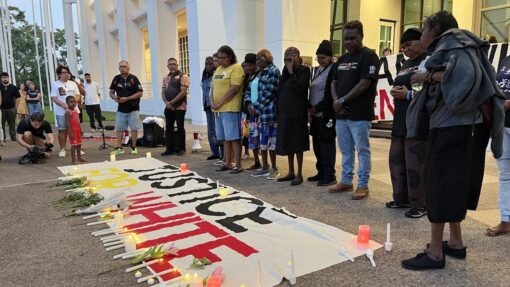Maori King Tuheitia dies after heart surgery
Ben McKay |

New Zealand’s Maori King, Kiingi Tuheitia, has died aged 69, days after the celebration of his 18th year on the throne.
The death was confirmed by the office of the Kiingitanga early on Friday morning.
“Kiingi Tuheitia Pootatau Te Wherowhero VII has died peacefully … accompanied by his wife Makau Ariki and their children Whatumoana, Korotangi and Ngawai Hono I Te Po,” it read.
Tuheitia was in hospital recovering from heart surgery.
“It didn’t quite go as we had all hoped,” the Kiingitanga’s chief of staff Ngira Simmonds told Radio NZ.

Tuheitia succeeded his mother, Te Arikinui Dame Te Atairangikaahu, following her death in 2006.
King Charles led tributes to Tuheitia, who he said he had known for decades.
“He was deeply committed to forging a strong future for Maori and Aotearoa New Zealand founded upon culture, traditions and healing, which he carried out with wisdom and compassion,” he said.
The pair met at Tuurangawaewae Marae in 2015, at Buckingham Palace in 2023, and spoke on the phone earlier this month.
The King added the whakatauki (Maori proverb) “Kua hinga te totara i Te Waonui a Tane” (“a mighty tree has fallen”).
Former prime minister Dame Jacinda Ardern described Tuheitia as “an advocate for Maori, for fairness, justice and prosperity”.
“You worked tirelessly on building understanding and knowledge of our shared history and in doing so, strengthening Aotearoa.”
The Maori King position was founded in 1858, aiming to be a unifying movement for all Maori tribes.
It is a largely ceremonial but hugely consequential role in New Zealand.
In recent months, Tuheitia co-ordinated national unity talks for Maori in response to the new centre-right government’s policies.
“He believed in the vision of his ancestors. He understood his role and his duties,” Mr Simmonds said.
“He wanted to serve and do everything that he could and exhaust every effort to bring unity to our people and indeed the nation at large.
“He served until the very last.”
Prime Minister Chris Luxon, in Tonga for the Pacific Islands Forum, also paid respects.
“His unwavering commitment to his people and his tireless efforts to uphold the values and traditions of the Kiingitanga have left an indelible mark on our nation,” he said.
“I will remember his dedication to Aotearoa New Zealand, his commitment to mokopuna, his passion for te ao Maori, and his vision for a future where all people are treated with dignity and respect.”
Last week, thousands of people travelled to Tuurangawaewae Marae for annual celebrations of the King’s ascension to the throne – including dignitaries from around the Pacific.
At a political forum, Maori speakers scolded the prime minister and other ministers for various parts of the government’s agenda, including a bill that would redefine the place of the Treaty of Waitangi in modern-day New Zealand.
The seat of the Maori King is held by the tribes of the central North Island, but it is not yet clear who will take the throne.
The Maori monarch is not hereditary by right, with Radio NZ reporting his successor will be appointed by tribal leaders on the day of the funeral, likely to be next week.
“It is expected that Kiingi Tuheitia will lie in state at Turangawaewae Marae for five days before he is taken to his final resting place on Taupiri Mountain,” Rahui Papa, a Kiingitanga spokesman, told TVNZ.
Mr Simmonds said the next few days would be for local tribes to mourn.
Others would then be welcomed to the marae, including international dignitaries, with a Maori funeral (tangihanga) to follow.
AAP


